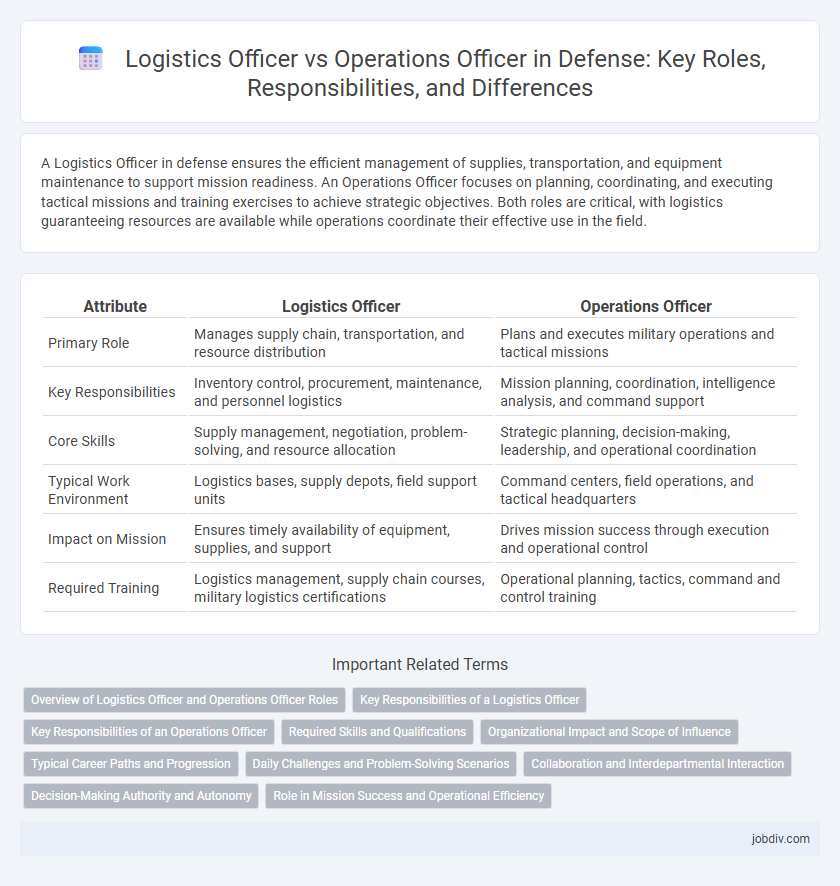A Logistics Officer in defense ensures the efficient management of supplies, transportation, and equipment maintenance to support mission readiness. An Operations Officer focuses on planning, coordinating, and executing tactical missions and training exercises to achieve strategic objectives. Both roles are critical, with logistics guaranteeing resources are available while operations coordinate their effective use in the field.
Table of Comparison
| Attribute | Logistics Officer | Operations Officer |
|---|---|---|
| Primary Role | Manages supply chain, transportation, and resource distribution | Plans and executes military operations and tactical missions |
| Key Responsibilities | Inventory control, procurement, maintenance, and personnel logistics | Mission planning, coordination, intelligence analysis, and command support |
| Core Skills | Supply management, negotiation, problem-solving, and resource allocation | Strategic planning, decision-making, leadership, and operational coordination |
| Typical Work Environment | Logistics bases, supply depots, field support units | Command centers, field operations, and tactical headquarters |
| Impact on Mission | Ensures timely availability of equipment, supplies, and support | Drives mission success through execution and operational control |
| Required Training | Logistics management, supply chain courses, military logistics certifications | Operational planning, tactics, command and control training |
Overview of Logistics Officer and Operations Officer Roles
Logistics Officers oversee supply chain management, ensuring timely delivery of equipment, materials, and personnel essential for mission success, while coordinating transportation, maintenance, and inventory control. Operations Officers plan, direct, and coordinate military missions, focusing on tactical execution, intelligence integration, and resource allocation to achieve strategic objectives. Both roles are crucial, with Logistics Officers concentrating on support and sustainment, and Operations Officers emphasizing operational command and mission coordination.
Key Responsibilities of a Logistics Officer
A Logistics Officer oversees the planning, coordination, and management of supply chains, ensuring timely procurement, distribution, and maintenance of equipment and materials critical to military operations. They manage inventory control, transportation, and resource allocation to support sustained mission readiness and operational efficiency. Their role includes coordinating with suppliers, managing logistics personnel, and optimizing logistics processes to reduce costs and enhance support capabilities.
Key Responsibilities of an Operations Officer
An Operations Officer in defense oversees mission planning, execution, and coordination of troop movements, ensuring strategic objectives are met efficiently. They analyze intelligence, allocate resources, and synchronize activities across units to optimize operational effectiveness. Their role is pivotal in adapting real-time battlefield dynamics and maintaining command communication flow.
Required Skills and Qualifications
Logistics Officers require expertise in supply chain management, inventory control, and resource allocation, alongside strong organizational and problem-solving skills to efficiently support military missions. Operations Officers need proficiency in strategic planning, mission coordination, and tactical decision-making, with a robust understanding of military protocols and leadership abilities. Both roles demand excellent communication skills, attention to detail, and the ability to adapt quickly in high-pressure defense environments.
Organizational Impact and Scope of Influence
Logistics Officers specialize in managing supply chains, transportation, and resource allocation, directly impacting operational readiness and mission sustainability across military units. Operations Officers coordinate planning, execution, and tactical decision-making, shaping overall mission success and strategic outcomes on both tactical and operational levels. The scope of influence for Logistics Officers centers on ensuring the efficient flow of materiel and support services, while Operations Officers influence real-time command and control, driving operational effectiveness and strategic alignment.
Typical Career Paths and Progression
Logistics Officers typically advance through roles emphasizing supply chain management, transportation coordination, and resource allocation, often moving from junior logistics planner to senior logistics manager or director within military or defense supply units. Operations Officers progress by gaining experience in mission planning, tactical execution, and command roles, commonly rising from operations coordinator to operations chief or battalion operations officer in combat or operational units. Both career paths offer leadership opportunities, though Logistics Officers focus on sustaining forces through efficient supply networks, whereas Operations Officers lead direct mission execution and strategic operational planning.
Daily Challenges and Problem-Solving Scenarios
Logistics Officers face daily challenges related to supply chain management, inventory control, and coordination of transportation, ensuring timely delivery of essential equipment and materials under strict deadlines. Operations Officers must address real-time tactical decision-making, resource allocation, and mission planning, often dealing with unexpected battlefield conditions and communication breakdowns. Both roles demand critical problem-solving skills, but Logistics Officers emphasize systematic resource flow, while Operations Officers prioritize dynamic operational adaptability.
Collaboration and Interdepartmental Interaction
Logistics Officers and Operations Officers collaborate closely to ensure mission success by coordinating supply chain management, transportation, and resource allocation with tactical planning and execution. Their interdepartmental interaction involves synchronizing logistics support with operational needs, enabling efficient deployment of personnel and equipment under dynamic conditions. This collaboration enhances situational awareness and operational readiness by integrating logistical capabilities with real-time mission requirements.
Decision-Making Authority and Autonomy
Logistics Officers exercise decision-making authority primarily over supply chain management, resource allocation, and equipment maintenance, ensuring mission readiness through efficient support operations. Operations Officers hold broader autonomy, directing tactical execution, strategic planning, and coordination of combat or mission activities, often making real-time decisions that directly impact mission success. The scope of autonomy for Operations Officers typically encompasses dynamic operational environments, while Logistics Officers operate within structured frameworks focused on sustaining forces.
Role in Mission Success and Operational Efficiency
Logistics Officers ensure mission success by managing the supply chain, coordinating transportation, and overseeing resource allocation critical to operational readiness. Operations Officers drive operational efficiency through planning, directing, and synchronizing tactical activities to achieve strategic objectives. Both roles are vital, with Logistics Officers providing the necessary support infrastructure and Operations Officers executing the mission plan effectively.
Logistics Officer vs Operations Officer Infographic

 jobdiv.com
jobdiv.com